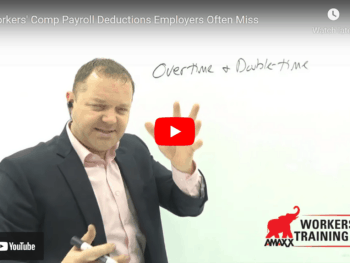Every employer buying workers compensation coverage knows it is an insurance policy for the costs associated with injured employees, but few employers ever read the actual policy. The primary reason most people do not read the insurance policy is because it is written in “insurance speak” or legalese. The following is an effort to translate a generic workers compensation insurance policy into everyday English so more people can understand it.
A workers compensation insurance policy is actually divided into two parts. The first half covers what most employers think of in workers compensation. The second part is the “Employers Liability Insurance.” Part two is designed to cover instances where workers compensation insurance does not apply and an employee brings a lawsuit against the employer. Part one’s coverage and workers compensation statutes are so broad that it is rare for an employee to be able to bring a claim under Part two. For the purposes of this article, we will only be addressing what is typically found in Part one of the policy coverage
Click Link to Access Free PDF Download
“Workers’ Comp Claims Review Checklist: 9 Must-Have, Serious-Impact Elements”
Section A – What the Insurance Covers
Workers compensation insurance will pay for injuries caused by accidents, or for illness/disease caused by being exposed to an unfavorable environment. Accidents and illnesses also include death. This section limits the coverage to the policy period. The injuries or illness has to be caused by conditions associated with the employee’s employment. If the work comp claim brought by the employee is for work-related illness, the employee’s last day of exposure to the conditions causing the illness must occur within the policy period.
Section B – What the Insurance Company Pays
The insurance company agrees to pay for all benefits as defined by the workers’ compensation statutes of the state where the employer does business. The insurance company agrees to make timely payment of these benefits.
Section C – The Right to Defend Claims
The insurance company reserves the right to determine which claims it will pay willingly and which claims it will contest. In exchange for the insurance company making this decision, the insurance company agrees to pay the cost of defending the employer from any claim brought against the employer. This allows the insurer to investigate and settle claims as it deems appropriate. It also includes the insurer’s right to not to defend a claim if it is not covered by the policy.
Section D – Additional Things Paid By Insurance
The insurance company agrees to pay the cost associated with the claim in addition to benefits provided by the work comp laws. This includes such things as:
- Attorney fees and expenses.
- Surveillance and extraordinary investigative expenses.
- Medical management expenses (triage, nurse case managers, etc).
- Court cost.
- Employer’s expenses incurred at the request of the insurer, excluding loss of earnings.
- Appeal bonds.
- Any other expenses incurred by the insurer.
Section E – When There Exists Other Insurance
If the employer has a self-insurance retention or large deductible, the insurer will not pay until the employer has met its financial responsibility under the policy. Also, (this rarely happens), if the employer has other workers compensation insurance that will pay for the employee’s injuries, the insurance company will not pay more than its share of the benefits.
Section F – What the Employer Must Pay
The insurance policy makes the employer responsible for payments when the employer:
- Intentionally fails to comply with a safety law or regulation.
- When the employer has serious and/or willful misconduct.
- When the employer knowingly employs someone in violation of the law.
- When the employee brings a claim against the employer for discharging, coercing or discriminating against the employee for bringing a work comp claim.
Also, if the insurance company is compelled to make a payment in one of these situations, the employer agrees to reimburse the insurance company for all cost associated with the situation.
Section G – The Right of Recovery
In exchange for the insurer paying the work comp claim, the employer and the employee agree the insurer will have the right to recover the cost of the claim from a third party who is at fault for the injury (think auto accident or equipment malfunction).
Section H – Legal Stuff
This section includes several miscellaneous conditions including:
- Most states consider notice to the employer of a work comp claim to be notice to the insurer.
- An employer’s bankruptcy does not relieve the insurance company from paying the work comp claims.
- The insurance company agrees it is primarily responsible for any benefits owed under the policy.
- The legal jurisdiction is the state where the employer is located.
- The insurance company agrees the policy conforms to the applicable law.
- The insurance company agrees to pay any special taxes or assessments that arise due to the issuance of the insurance policy.
- Anything in the policy that conflicts with the state law is modified to comply with the state law.
Not every workers’ compensation policy will follow this generic outline, but the above outline should assist you in understanding your workers’ compensation insurance policy.

Author Michael Stack, CEO Amaxx LLC. He is an expert in workers’ compensation cost containment systems and helps employers reduce their workers’ comp costs by 20% to 50%. He works as a consultant to large and mid-market clients, is a co-author of Your Ultimate Guide To Mastering Workers Comp Costs, a comprehensive step-by-step manual of cost containment strategies based on hands-on field experience, and is founder & lead trainer of Amaxx Workers’ Comp Training Center .
Contact: mstack@reduceyourworkerscomp.com.
Workers’ Comp Roundup Blog: https://blog.reduceyourworkerscomp.com/
©2018 Amaxx LLC. All rights reserved under International Copyright Law.
Do not use this information without independent verification. All state laws vary. You should consult with your insurance broker, attorney, or qualified professional.












